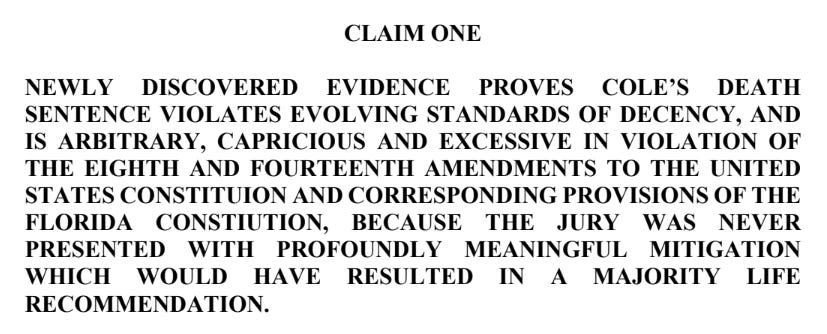Cole Warrant: Successive postconviction claims
Cole’s successive motion for postconviction relief following his death warrant has been filed in the circuit court. The circuit court’s ruling is pending and must be completed by Friday.
Gov. DeSantis has issued a warrant for Loran Cole’s execution, which has been scheduled for August 29 at 6:00 p.m.
On Saturday, Cole, through his attorneys, filed a successive motion for postconviction relief following the warrant. The State responded on Sunday, arguing that the motion should be summarily denied.
The circuit court’s ruling is pending, and the proceedings must be completed by Friday at 3:00 p.m. absent a stay. Cole filed a motion to stay his execution and the proceedings, which the circuit court denied in an Order yesterday.
In his postconviction motion, Cole asks the court to vacate his conviction and sentence of death and raises three claims:
In this claim, Cole argues that mitigation related to his time at the Arthur D. Dozier School for Boys (“Dozier”) was not presented to the jury and would have changed the outcome of his case if it had been. Cole attended dozier for the better part of 1984 and, according to the motion, sustained horrific abuse while there:
During that brief period, he witnessed rapes and beatings. Shortly after he arrived at Dozier, Cole attempted to escape to safety. He was captured, and the staff punished him by breaking both his legs. He continued to suffer torturous treatment throughout his time at Dozier.
Cole estimates that he experienced beatings 2 to 3 times a week. Some beatings were for reasons like stealing food, trying to run away, and for such trivialities as walking on the wrong side of the sidewalk. While at Dozier, under the care and supervision of Florida, Cole was anally raped by a guard named D.J. Pittman. On another particularly traumatic occasion, a dog raped Cole and oversaw by a guard named “Randy.” Shortly before Cole was released from Dozier, he had to clean up the remains of guts and brains from another child, who jumped off the roof of one of the cottages. Cole’s wife, Colleen Kucler viewed bruises on Cole’s back and buttocks shortly after his stint in Dozier.
According to the motion, Cole still suffers from the effects of what he experienced while at Dozier:
Cole never received proper counseling and medicative care for the brutal trauma he experienced from Florida’s staff. He carried trauma from the experiences with him throughout his adult life. Cole never saw a mental health professional about the state inflicted trauma until it was too late, after he was sentenced to Florida’s death row.
The motion states that an expert on Dozier “discovered that 174 of the 180 boys who graduated [from Dozier] in 1988 were subsequently rearrested” and that that “97% rate is indicative of how the facility failed boys like Cole, when they were supposed to rehabilitate him.”
Further, the motion argues that recent legislation related to Dozier “is newly discovered evidence that standards of decency have evolved.” (I will be posting more information on Dozier and the legislation soon.)
In response, the State argues that “th[e] claim is untimely, is procedurally barred, and is meritless because the evidence is unlikely to have resulted in a life sentence even if the jury had heard it presented in mitigation during the penalty phase.”
In Claim 2, the motion argues that, “[f]or three decades, Cole has experienced neglect and mistreatment,” which “violated Cole’s constitutional rights while in the state’s custody and care.” Specifically, the motion states:
Florida has offended Cole’s dignity by denying him proper medical treatment, allowing him to have access to illicit drugs, and then punishing him with disciplinary reports for their own incompetent security measures. Cole is prepared to testify about the neglect he experienced for years on Florida’s death row in the Union Correctional Institution. . . .
Two years ago, Cole was provided a “laced” suspected cannabis joint by a correctional officer named Crosby. The joint turned out to be infected with Fentanyl. Cole has not physically or mentally felt the same since that day. Cole has also been self-medicating with a synthetic drug known as “K2,” while in the care and control of FDOC custody. It is cruel and unusual to punish Cole by taking away his privileges and placing him in a restrictive isolating environment, when staff in the FDOC is responsible for allowing the illicit drugs to be in Cole’s possession.
Cole has been self-medicating for the severe tremors from his Parkinson’s disease and is willing to testify about how FDOC has not promptly responded properly to his fainting spells and overall declining health. . . . The needless, cruel subjugation to prolonged disciplinary restrictions, including the neglect and drug use, superadded to the length of time Cole has spent on death row. The treatment constitutes cruel and unusual punishment in violation of the Eighth and Fourteenth Amendments. The further addition of an execution at the end of this lengthy period of neglect and maltreatment compounds the cruelty and wanton infliction of unnecessary pain to Cole’s punishment.
Again, the State argues that the claim is untimely, procedurally barred, and cannot be resolved in a 3.851 motion.
In Claim 3, Cole raises an as-applied challenge to Florida’s lethal injection protocol. The State argues that “Cole was dilatory in waiting until now to raise this claim” and, therefore, the claim is untimely. The State further argues that the claim fails on the merits because “Cole has not demonstrated that Florida's lethal injection protocol—as applied to him—violates the Eighth Amendment of the United States Constitution.”
The full Motion can be downloaded here.
The State’s Response can be downloaded here.
This morning, the circuit court held a hearing and reserved ruling on the pending postconviction motion. Another hearing is scheduled for Friday at 9:00 a.m.
My thoughts are with everyone involved in the warrant and execution process.






